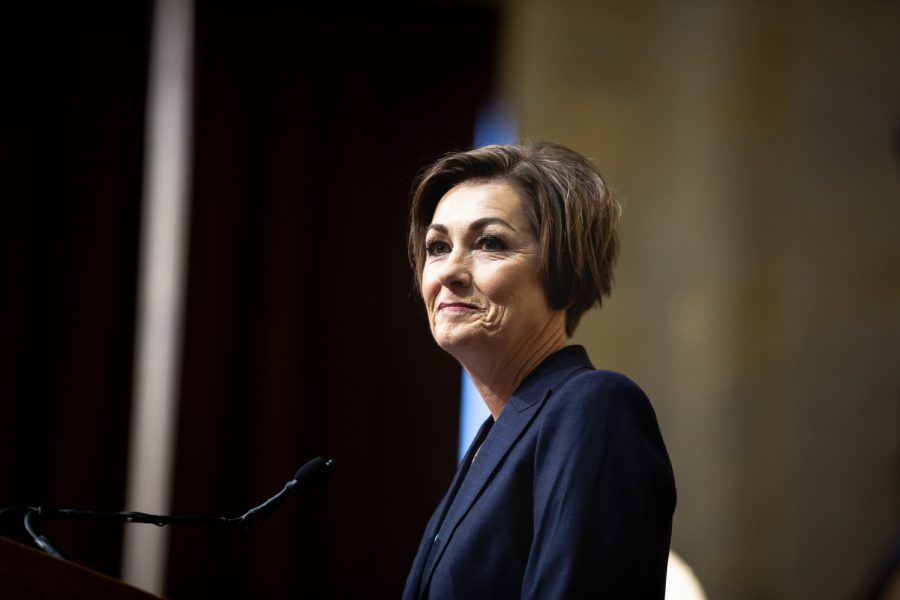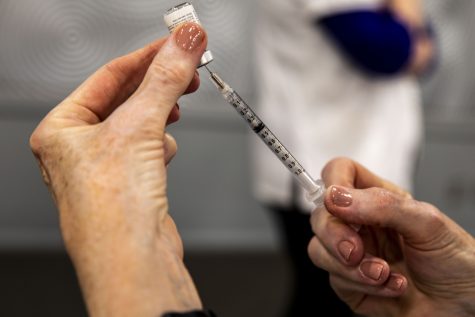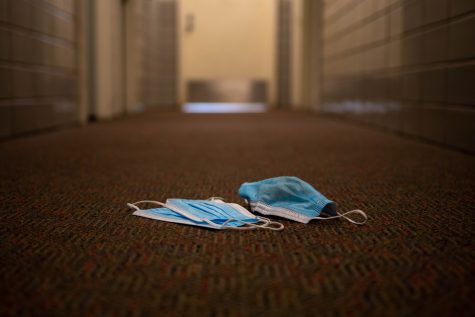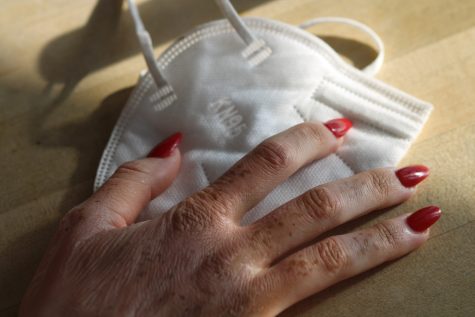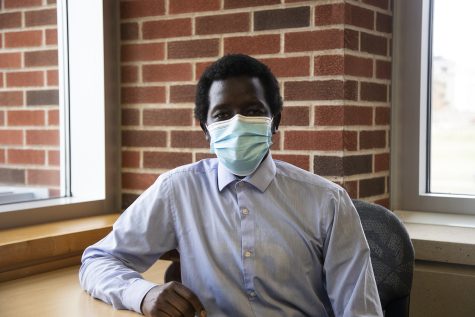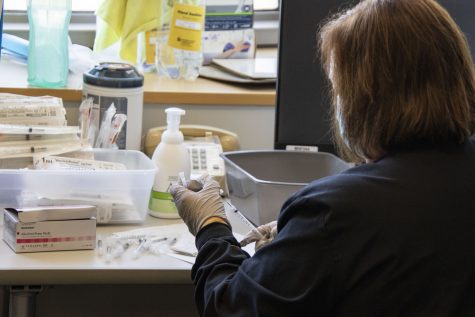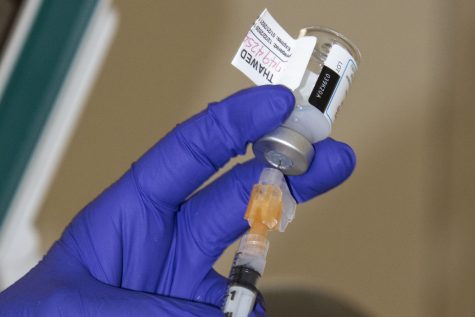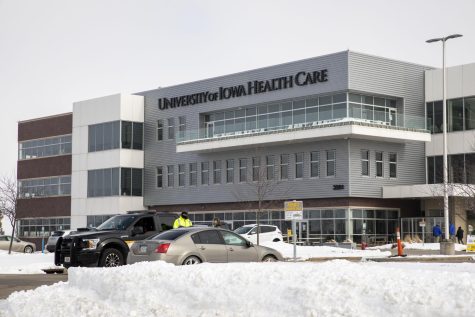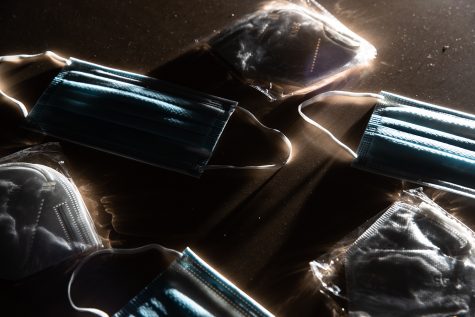Gov. Kim Reynolds announces three presumptive positive coronavirus cases in Iowa
The first three presumptive positive cases of the 2019 novel coronavirus in Iowa, all from Johnson County, were on the same cruise in Egypt.
Gov. Kim Reynolds speaks during the Condition of the State address at the Iowa State Capitol on Jan. 14.
March 8, 2020
Iowa Gov. Kim Reynolds on Sunday announced three presumptive positive cases of novel coronavirus in Johnson County.
The Iowa Department of Public Health reported that one of the individuals is between ages 41 and 60, and two are between ages 61 and 80. All three individuals were part of a cruise in Egypt and returned to Iowa March 3, Iowa Department of Public Health Medical Director and State Epidemiologist Caitlin Pedati said. Confirmatory testing is pending from the Centers for Disease Control and Prevention.
The three individuals residing in Johnson County are recovering at home in isolation. Two individuals had underlying health conditions and one did not.
Iowa previously had no reported cases of the novel coronavirus, and state health officials had maintained that the state’s risk was low for an outbreak.
“While this news is concerning, it’s not cause for alarm,” Reynolds said during the news conference. “The most important thing that we can do right now is remain calm, understand the situation, and stay informed in the days and weeks ahead. We are committed to transparency and keeping the public informed.”
In an email to the campus community shortly after Reynolds’ press conference, the University of Iowa said Sunday’s announcement will not immediately impact the university’s operations.
The message said any changes in operations — including student instruction — will be made in tandem with the Iowa Department of Public Health and the state Board of Regents, among other agencies.
An email sent to Tippie College of Business students March 2 said instructors and advisers were preparing to cancel some classes and appointments in case of a widespread coronavirus outbreak in Iowa. UI officials have not confirmed such plans are in place across the university, but have said they’re following the campus’ critical-incident management plan to cooperate with public entities that manage disaster control to continuously plan and minimize risk from such incidents.
Charles Peckman/The Daily Iowan
Iowa public-health officials aren’t recommending any additional precautions for Iowa residents besides typical precautions to combat the flu including frequently washing hands, covering coughs and sneezes, and staying home when ill.
“[The Iowa Department of Public Health] is working with local public health to assess potential exposures to others,” Pedati said. “These cases are an important reminder that all Iowans need to help prevent the spread of illness by washing hands frequently, staying home when ill, and covering coughs and sneezes with a tissue.”
Flanked by officials from the Iowa Department of Public Health, Iowa National Guard, and Iowa Department of Homeland Security, Reynolds urged employees to work from home should they feel under the weather. Asked what these employees should do in circumstances where it is not economically feasible for them to do so, Reynolds emphasized that health concerns should come first.
“Well, they just need to stay home,” she said. “And that’s what we need to say. I think businesses are aware that in order to contain this as much as we can, Dr. Pedati has outlined a process that is standard and Iowans should try and follow.”
RELATED: UIHC prepares for coronavirus response, cautions against spreading misinformation
The University of Iowa-based State Hygienic Laboratory is conducting testing in Iowa using materials provided by the CDC upon the Iowa Department of Public Health’s request. The department reports that 37 individuals have tested for COVID-19, with 26 negative cases, eight tests pending, and three presumptive positive cases.
As of Sunday night, 537 people in the U.S. had been treated for the coronavirus in 34 states and Washington, and at least 22 people have died, according to a New York Times database.
U.S. efforts to test for coronavirus have come under scrutiny as helping the virus spread in the country after the Trump administration opted to forego using the World Health Organization test and other countries more rapidly developing their own tests.
Other countries such as South Korea have made their tests more widely available, using drive-thru clinics for citizens who suspect they may have coronavirus to take a quick test administered by medical staff in protective clothing.
President Trump on March 6 signed off on an $8.3 billion emergency-aid package to fund efforts to combat and research the coronavirus in hopes of developing a vaccine for the disease.
Asked March 4 about the criticism of testing not being widely available in the U.S., State Hygienic Laboratory Director Michael Pentella said, “I would say that the FDA has been working on that, and the changes they made this past weekend will bring more laboratories able to do this testing in the future, so I don’t think that’s a problem in Iowa at the current time.”
Reynolds announced the partial activation of the State Emergency Operations Center in Johnston, Iowa amid the rising concerns on March 7 to help coordinate the response across the state.
During a call with The Daily Iowan and other organizations on March 6, Sen. Joni Ernst, R-Iowa, said although she has not discussed the spread of COVID-19 with the leaders of Iowa’s state Board of Regents universities, conversations between her office, the universities, and various health organizations are “ongoing.”
“At the end of the day, we can’t emphasize enough how important it is for folks in Iowa and across the country to do basic things to stay healthy and help prevent spread,” she said. “And that means the simple stuff like washing your hands regularly covering your mouth if you have a cough and to just stay at home if you’re feeling sick.”
The regents canceled all university-sponsored international travel for faculty, staff, and students for 30 days starting March 5, and the UI has pulled students from spring study-abroad programs in China, Italy, Japan, and South Korea.



